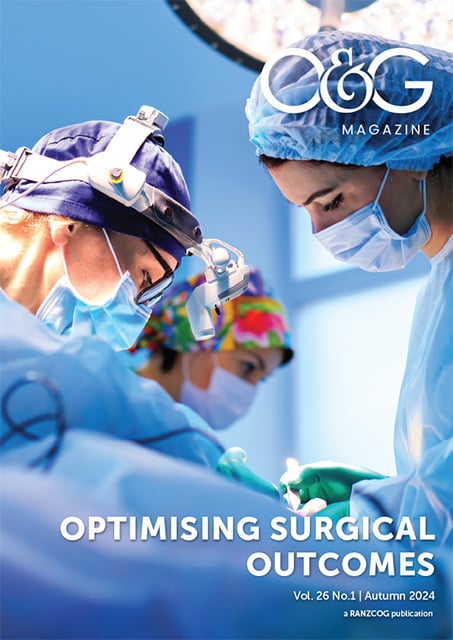For most of us, life is busy. We work a combination of jobs, often across both the private and public sector, operate at a number of different hospitals with multiple teams, and try to do our best to strive for that elusive ‘life/work’ balance.
The surgical component of our professional life often demands our attention, from that very first appointment and continues throughout the recovery period and sometimes longer. We strive for safety, efficiency and precision. We want our patients to recover well. We want our complications rate to be low, our skills to expand and our reputation to be well rounded. This all translates to job satisfaction, professional longevity, and increased referrals.
In this edition of O&G magazine, we cover some aspects of care that can contribute to improving surgical outcomes, both in terms of recovery and ongoing management, and aim to provide helpful strategies and ideas with direct application to our surgical work. As we are unable to cover the full scope of peri-operative interventions, we hope to start a wider conversation in workplaces to develop these ideas further. In particular, the consideration of unique circumstances that often requires a personalised management plan. For instance, a patient with a history of trauma or chronic pain, with transvaginal mesh, who are gender diverse and/or of advanced age and presenting co-morbidities.
Surgery forms a substantial part of practice for most obstetricians and gynaecologists, and it is an integral part of our curriculum. Our early training starts with dilatations and curettage, and quickly progresses to laparotomies, often while our gynaecology surgical skills are still in their infancy. As we progress through our speciality training, we are exposed to various approaches to care, a raft of surgical techniques and wide-ranging spectrum of management of the peri-operative patient.
As we have heard over the last few years, it is not unusual for trainees to have to advocate for further surgical training due to limited caseloads and disproportionate time allocated to obstetric service.1 This, and the inconsistencies of the surgical experience, particularly during Fellowship training, have now been more widely recognised and several initiatives aim to address it. At College level, a review of the Curriculum aims to harness the limited surgical contact into streamlined modules: two surgical committees are scrutinising surgical numbers with the aim of providing solutions to ensure surgical competency (Endoscopic Surgery Advisory Committee and Gynaecology Surgery Training Working Group); and excellent work is being done to incorporate simulation to address training needs (through the Simulation Advisory Training Group).
Furthermore, post-Fellowship, specialised surgical training is becoming a frequent extension to training. It aims at achieving and developing specialist skills, such as advanced laparoscopy (AGES), pelvic floor repair (CU) and extensive abdo-pelvic, vulval and groin dissection (GONC). Even without subspecialty training, many opt to complete extra training to feel confident progressing in the independent provision of surgical care. Preparation of the patient for surgery and post-operative care does not currently feature in the RANZCOG curriculum2 and is mainly taught ‘on the job’, to various extents. The latter is dependent on program, hospital, and supervisor – and hence often inconsistent.
For many trainees and Fellows, exposure to Early Recovery from Surgery (ERAS) protocols3,4 happens as part of or continuing professional education. In this issue, Boo and Brand expand on ERAS, as applied within gynaecology oncology,4 although the tenets can be generalised across gynaecology surgery. Benign obstetric and gynaecology pathways also exist and can be freely accessed via ERAS Society for minimally invasive, vulval and vaginal surgery and Caesarean section.3 As a protocol, it encompasses many of the ideas we will discuss in this edition and guides us to best practice peri-operative care. Many of its recommendations are easy to implement and cost effective. ERAS has now been in existence for three decades, and evaluation studies particular to our specialty demonstrate clear benefits, including reduced stay duration, less readmission and ileus; less post-operative nausea and vomiting, and decreased hospital costs.5,6,9 If we also apply data from Minimally Invasive Surgery in general surgery (with a longer evaluation profile), such studies show a benefit in decreased length of stay, reduced use of opiate analgesia but without increasing complications or readmissions.7,8 A win-win for patients, surgeons, and health networks.
What we have not covered in this edition are issues of pre-operative counselling and consent. These are both imperative to setting patient’s expectations of their surgical journey, developing rapport and trust between patient and surgeon and, from a medico-legal perspective, ensuring the right operation is planned. In our field, surgery can have multiple intents: curative, often diagnostic, adjunct to other treatment, repeat due to recurrence, or refractive to other treatment. As such, appropriate counselling is essential.
Do not underestimate the impact of your relationship with the patient: if you have established this rapport, just by your presence and easy banter by their bed, you will reduce their peri-operative anxiety and increase their chance of a better recovery.10Optimising surgery also means looking after the surgeon, in other words: ourselves. This can mean good ergonomics, a familiar theatre team, continuing professional education and appropriate rest from work. There are also multiple aspects of the theatre environment that can affect our performance and patient-centred approach to clinical care. For example, is noise affecting surgical outcomes? High noise levels can apparently impact performance negatively.11 But is music good for our patients? Yes, if it is gentle and their choice, it can help reduce anxiety.12
We could easily devote a whole separate edition to these issues and some of these matters were indeed expanded on in O&G Magazine, Vol. 21 – In Theatre, which I thoroughly recommend.
For now, we hope to provide an overview of surgical optimisation and we welcome your feedback regarding other novel methods in ensuring good outcomes for our patients.
References
- Acton, Jade. 2019 FRANZCOG Training: Suitability for surgery. O&G Magazine – In Theatre, Vol. 21, No.3, Spring Ed.
- FRANZCOG 2024. Royal Australian and New Zealand College of Obstetricians and Gynaecologists. Fellowship of RANZCOG Curriculum. Accessed 24 Jan 2024.
- Nelson, G. et al. 2019 Guidelines for perioperative care in gynaecologic/oncology: Enhanced Recovery After Surgery (ERAS) Society recommendations-2019 update. Int. J. of Gyn. Cancer.
- ERAS Society. erassociety.org/specialty/gynaecology. Accessed 24 Jan 2024.
- O’Neill, A. M., Calpin, G.G., Norris, L. and Beirne, J.P. 2022. The impact of enhanced recovery after gynaecological surgery: A systematic review and meta-analysis. Gynaecologic Oncology 168: 8-16. DOI: doi.org/10.1016/j.ygyno.2022.10.019
- Marchand, G.J. et al. 2021. Systematic review of the effect of implementing enhanced recovery after surgery on selected attributes of surgical recovery in gynaecology. Turk J. of Obstet. Gynecol. 18(3): 245-257.
- Sauro, K., Smith, C., Bakuda, L., Ibadin, S. and Bisch, S. 2023 The state of evidence for ERAS effectiveness: A systematic review and meta-analysis. Clinical Nutrition 57:785. DOI: doi.org/10.1016/j.clnesp.2023.06.057
- Tian, Q., Wanga, H., Guob, T., Yaoc, B., Liub, Y. and Bo Zhu, B. 2024. The efficacy and safety of enhanced recovery after surgery (ERAS) Program in laparoscopic distal gastrectomy: a systematic review and meta-analysis of randomised controlled trials. Annals of Medicine. 56(1), doi.org/10.1080/07853890.2024.2306194
- Suh, C., Worndle, N., Mollner, M. and Balica, A. 2018. Enhanced Recovery After Surgery (ERAS) for Benign Minimally Invasive Gynaecology. Obstetrics and Gynaecology: 131 (1): 41S-42S, May.
- Sriramka, B., Mallik, D., Singh, J. and Khetan, M. 2021. Effect of handholding and conversation alone or with midazolam premedication on preoperative anxiety in adult patients — A randomised controlled trial. Indian J. of Anaesthesia. 65(2): 128- 132.
- Fu, V.X., Oomens, P., Merkus, N. and Jeekel, J. 2021. The Perception and Attitude Toward Noise and Music in the Operating Room: A Systematic Review. Healthcare delivery, quality and safety. 263: 193-206.
- Sadideen, H., Parikh, A., Dobbs, T., Pay, A. and Critchley, P.S. 2012 Is there a role for music in reducing anxiety in plastic surgery minor operations? The Annals of the Royal College of Surgeons of England 94 (3), doi.org/10.1308/003588412X13171221501861





Leave a Reply